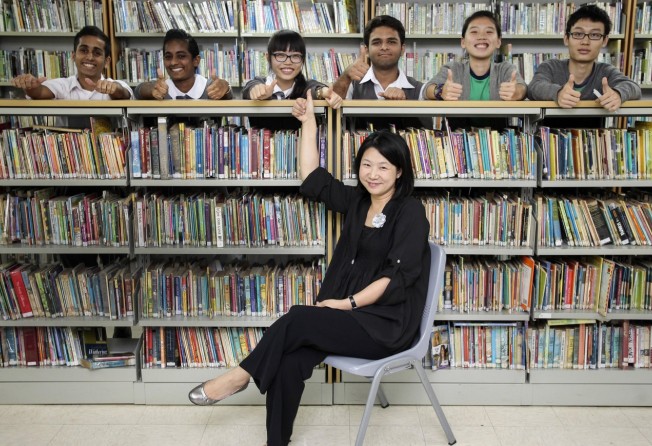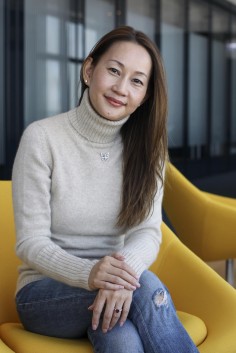Global Dignity initiative helps young people deal with prejudice
The Global Dignity initiative helps marginalised students understand their own worth and deal with prejudice, writes Mabel Sieh

Dignity sounds like the lofty subject of a philosophy lecture, but many ethnic minority students have experienced how it is something that can be violated on a daily basis. Talha Muhammad Qureshi, a Form Five student in Delia Memorial School (Hip Wo) in Kwun Tong, vividly recalls an ugly encounter while commuting to school.
"A woman sat next to me on the MTR and she started waving her hand, gesturing that I was smelly. She was well dressed and looked educated. I didn't know why she had to do that. So I copied her and waved my hand like she did," says Talha, 18, who arrived from Pakistan five years ago. "She got angry and threatened to complain to my school, but I wasn't the one who started it."
His schoolmate Royden Francis Noronha had a similar experience on a visit to Ocean Park: "I was lining up to get on a ride with my friend, when suddenly a local man said: 'Don't stand next to me, go somewhere else'."
But unlike Talha, the 16-year-old student chose to walk away. "We didn't want to make a scene. But we know what he did was wrong," he says.
Although born in Mumbai, Royden has grown up in Hong Kong, having settled here with his family when he was four. Still, many Hongkongers reject Royden as an outsider.
The two teenagers were among 250 students from the school who related their stories last year as part of the Global Dignity initiative to help young people understand their own worth and realise their dreams.
Set up by Crown Prince Haakon of Norway, US anti-poverty activist John Hope Bryant and Finnish academic Pekka Himanen in 2006, the movement aims to advance the right of every person to live with dignity, which they regard as fundamental to all human rights.
Defining dignity as having the opportunity to realise one's potential based on a "human" level of health care, education, income and security, the organisation focuses mainly on empowering young people and helping others do the same.
It hosts workshops where volunteer facilitators introduce the concept to youngsters by relating their personal stories.
Young participants then share their own experiences and typically write a letter to themselves outlining what they hope to achieve for themselves and others by living with dignity. This letter is returned to the writers a year later, to prompt re-evaluation.
A litany of personal setbacks may seem disheartening, but it is also the beginning of support and understanding, a core value needed in a diverse society.
"It's very important that [students] get to listen to each other's stories. By hearing one another, they get inspired," says Connie Lau Man-yuen, Delia Memorial's head of multicultural education events.
"Dignity is a topic we value in our school, which has a diverse mix of students from 25 nationalities and cultures. Through the sessions, students will build their understanding of their identity and worth, and learn to respect others."
Held for the first time in her school last October, the Global Dignity Day event proved so successful Lau is planning another day of workshops in June to help Form Four students reflect on their life goals as they enter a new phase in learning.
Diana Tsui, who leads the local chapter of Global Dignity, is now working with her team to put together a curriculum to help teachers introduce the concept in secondary schools across the city.
The teaching material will be tailored to fit under the "moral and civic education" component of Other Learning Experiences (OLE) in the syllabus. A number of schools have expressed interest in organising Global Dignity Day activities.
Tertiary institutions are also discovering the benefits: Lingnan University held an event over the past weekend, and the group is in talks with Hong Kong and City universities to bring Global Dignity Day to their campuses.
While dignity is a universal concept, Tsui believes marginalised groups such as Hong Kong's ethnic minorities require greater attention.
"When I look at minority children, I feel for the challenges they're facing. They may not all need financial support but their identity needs to be recognised. They need someone to say to them: 'You can do it.' They need inspiration," she says.
The head of corporate social responsibility and diversity for KPMG China, Tsui has a soft spot for mainland students here - she experienced the same alienation when she moved to Hong Kong as an eight-year-old.
Although her mother is a Hongkonger, Tsui says, "When I first came, I didn't speak any Cantonese or English. Without the language, it was hard to adjust. I didn't feel any sense of belonging."
Tang Ka-lo can relate to that. The 15-year-old struggled to adjust when she relocated from Shanghai last January to join her parents. "It is very hard to communicate with local residents as my Cantonese is still not very good," says Ka-lo, now in Form Four at Delia Memorial.
Even eating out could be discomfiting: "We sat down at a big table with some locals. As I started ordering in Putonghua, everybody looked at me in a strange way. I told myself not to mind them. I know I have a lot to learn here. But it's not a nice feeling," she says.
Fellow student Cheung Ka-ki reckons she lost important opportunities because of her lack of Cantonese. "When I first arrived three years ago, I tried to get into another school. After taking a test, I did an interview where teachers asked me some questions.
"I answered them all in Putonghua. After the interview, they sent me away without even looking at my test results," Ka-ki says. "I was really disappointed. Even though I didn't know Cantonese, it didn't mean that I was not an able student."
As discouraging as some experiences have been, the teenagers have been heartened by sharing these personal stories. "From listening to others, I realised that dignity comes from myself. I have to respect myself first, then I can respect others. We need to work together to build a harmonious community," Ka-lo says.
Talha agrees. "We should rise above hatred and not embrace it," he says. "I will remind myself not to focus on people who don't like me, but give attention to those who encourage me. And I will continue to appreciate myself and believe in myself."
On the mainland, the Global Dignity initiative has also received good responses at schools in Beijing, Shanghai and Chengdu, particularly with children of migrant workers, and Tsui has since received requests for repeat visits.
"We need to instil positive values such as a sense of equality in young people, so that they'll grow up with an understanding of what dignity means and learn to support different kinds of people in the community," she says.
"At the end of the day, we all ask, 'What is my worth? What is it that motivates me to move forward in life?' "With dignity comes acceptance of yourself and others, and the key to improving ourselves to become a better person than we were yesterday."
For more information, visit globaldignity.org.hk
